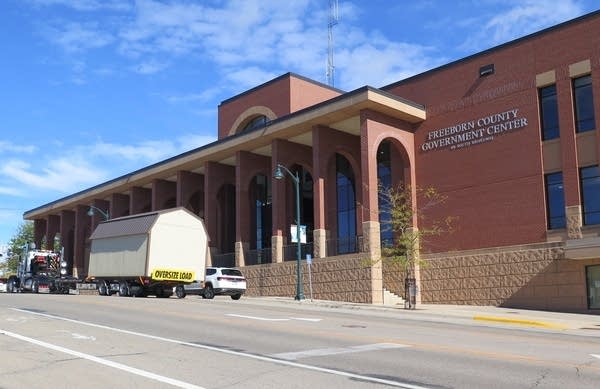
Albert Lea is a city built around lakes, perfect for boating much of the year and ice fishing when frozen over. But it’s the land, not the water, that’s going to be harder to contend with for many residents come next year.
That’s because property taxes are going to carry more of a sting.
The city of Albert Lea, Freeborn County and the Albert Lea School District have all proposed to raise their tax levies for 2026 — by 8 percent for the city, 15 percent for the county and 6.7 percent for the school district.
Even local officials who help set the levies know that there could be a compounding effect.
"You may think $50 or $100 more a year isn't a big deal. It's a big deal to people that are living on a fixed income,” Albert Lea Mayor Rich Murray said in an interview this month. “And so we have to be very cognizant of that fact.”
A number of factors are having a snowball effect, from inflation to rising operating expenses to costs being passed down by the state and federal governments. It’s not just here in this city along the Iowa border in southern Minnesota. Sticker shock awaits many property owners across Minnesota as parcel-specific tax notices begin arriving in mailboxes soon.
Around the state, local leaders in some places have proposed some of the steepest single-year levy increases in recent times.
In Winona, the city has proposed a 9.3 percent levy increase, while Winona County proposed a 12.5 percent increase. In Duluth, the levy could rise by 4.1 percent while the county it is in, St. Louis County, has put up a 12.4 percent increase. The levy percentage increase is not necessarily the actual tax increase a property owner will see, because that amount is spread out over all kinds of property, with the exact rate determined by the classification and value for land and buildings.
Just outside of downtown Albert Lea, Dan Dorman’s family has owned Hanson Tire Service for five decades.
Dorman said costs all seem to be going one way: up.
“That's hard to swallow, and it would be impossible to ask our customers to swallow,” he said. “So, you know, we'll ride it out. We're in this for the long term, good years and bad years. But I think it's some dark clouds on the horizon.”
Dorman, a former Republican state lawmaker, also owns rental properties and several mini-storage units in Albert Lea. He said the proposed tax hikes are hard to stomach.
“If Washington shifts costs to the states, and states shift to county, city or school districts, ultimately it's being shifted to the property taxpayer,” he said. “And a property tax is a regressive tax. It does impact those low-wage earners more than it does high-wage earners. And I think we need to be more sensitive to that when we start pushing those rate increases.”
Freeborn County Administrator Melanie Aeschliman said the county is doing what it can to deal with a 43 percent jump in employee health care costs and increased salaries for county employees. But another big factor is inflation.
"It comes at a time that we have a lot of change passed down from federal and state,” she said. “So I think it was just a recipe for — I don't want to say disaster — but for a large increase in the levy to try to get caught up to get where we need to be within our budget and be able to manage the impacts that are coming.”
The National Association of Counties says new federal requirements for SNAP and Medicaid work rules add administrative duties for counties. That might mean more staff and other costs to administer safety net programs. Freeborn County expects that to add up to hundreds of thousands of dollars.
All that spills downhill just as households confront rising food, health care and energy bills.
Martha Jones, who lives in Albert Lea, is frustrated that taxes are increasing when she feels the county is not being frugal. She points to the recent hire of an outside contractor for $600,000 to help with assessments when there's already an assessor on staff.
"I feel like our county and our administrator don't know how to prioritize and don't know how to spend wisely and they are putting undue pressure on the taxpayers,” she said.
At city hall, Mayor Murray says a proposed 8 percent levy increase faces similar scrutiny.
"This is probably one of the toughest ones we've had, although it has been rising the last couple years,” he said.
Murray has heard already from residents about the proposed tax hike and how money gets spent. He predicts city leaders will ratchet back some, but is frank that any increase will be tough.
The tax increases aren't set in stone yet.
Cities, counties and some school districts must hold public meetings where citizens can chime in before they finalize tax levies by the end of the year.